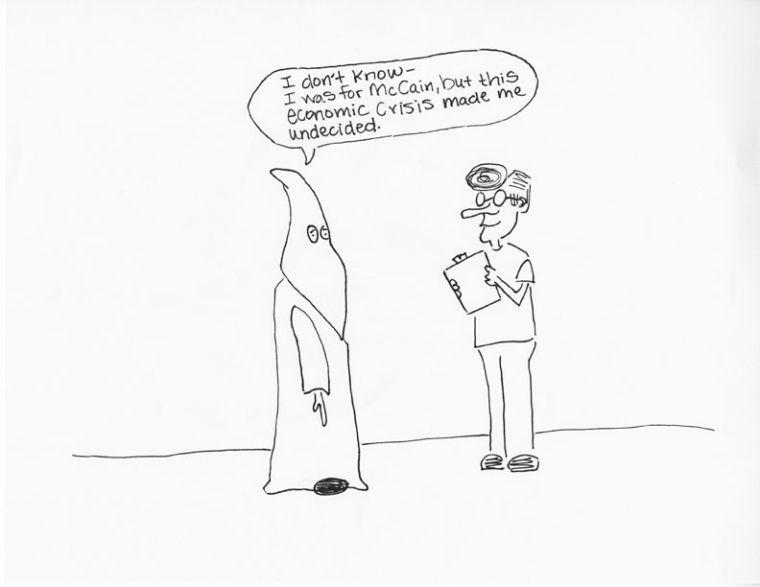Have you ever lied on a survey?Come on — maybe you weighed 110 pounds instead of 120, or maybe you had an athletic body type rather than the infamous couch potato form. According to one theory, there might be a significant number of people who are lying to pollsters as we speak — only these aren’t surveys you fill out for extra credit.The Bradley Effect is a phenomenon that some analysts believe may damage Sen. Barack Obama’s presidential prospects Nov. 4.It was named for Tom Bradley — a former black mayor of Los Angeles and 1982 gubernatorial candidate. As the story goes, Bradley maintained a significant lead over his white Republican opponent in pre-election polling, but Bradley narrowly lost the election.In an effort to explain the discrepancies in the pre-election polling and the final outcome of that gubernatorial race, some observers suggested a significant number of white respondents told pollsters they were going to — or were willing to — vote for a black candidate.But when the time came to vote, these white voters ended up supporting Bradley’s white challenger. At first glimpse, it seems plausible. White voters, afraid of being labeled as “racists,” lie to pollsters and say “Sure, I’ll vote for a black guy.” Then, when the time comes, whites — overwhelmed with racist tendencies — can’t bring themselves to vote for the black guy.There have been elections since that some believe contained a Bradley Effect as well. Here at home, some credit Gov. Bobby Jindal’s failed gubernatorial bid in 2003 to the Bradley Effect, pointing to polls that gave him a lead. By no means, though, is the Bradley Effect universally thought to be a real phenomenon. Polling is a tough science — it’s conceivable that the polling itself, rather than the candidate or voters, was flawed. The theory is also based on a large assumption that race swayed some voters’ last-minute decisions — rather than, say, an effective ad blitz or specific issue. It’s also a bit hard to prove. How can we know if someone lied in a survey?”It’s hard to say with certainty when a Bradley Effect occurs — by definition it’s hard to document with traditional survey methods because it involves people lying about how they plan to vote,” said political communications professor Regina Lawrence. But let’s play the game anyway — let’s assume that, perhaps, the Bradley Effect has existed before. Will the Bradley Effect alter the outcome of the 2008 presidential election? Are Obama’s strong poll numbers artificially inflated by white people who won’t really vote for him?The extensive Democratic primary that ran through all 50 states — and some U.S. territories that don’t even cast electors in the general election — has already given this theory a test. Nate Silver, a polling analyst who runs FiveThirtyEight.com, has found there is “simply no empirical evidence that the Bradley Effect exists any longer.” After comparing the pre-election polls for the Democratic primary to the actual results in each state, Silver found Obama actually over-performed his projected trend lines by 3.3 points. On average, Obama generally did better than the pre-election polls projected him to do. Lawrence credits this apparent lack of any Bradley Effect to a change in racial attitudes — “underlying racial attitudes are softening, with more and more whites willing to vote for a black candidate,” she said. Lawrence was careful, though, to emphasize that this softening of racial divides was not noticeable everywhere.Another factor, Lawrence said, is the type of campaign Obama has run: “He’s made almost no noticeable racial appeals, making him considerably easier for many white voters to accept.”Silver also notes there are other factors that might be skewing poll results in Obama’s favor — like pollsters underestimating youth turnout or black turnout, and pollsters’ failure to account for the cell-phone-only population — that would cancel out a possible Bradley Effect anyway.What about a “reverse” Bradley Effect? Are there voters who say they support McCain but will ultimately vote for Obama? There is some evidence to suggest such a phenomenon.First, go back to the Democratic primary: On average, Obama over-performed pre-election polls. There are also dozens of reported incidents of professed racists who have decided to support Obama anyway. “If you go to a white neighborhood in the suburbs and ask them, ‘How would you feel about a large black man kicking your door in,’ they would say, ‘That doesn’t sound good to me,'” veteran Democratic strategist Paul Begala told Politico.com, “But if you say, ‘Your house is on fire, and the firefighter happens to be black,’ it’s a different situation.”Begala was referencing the economic meltdown and the overwhelming importance it seems to be holding on voters’ minds these days.After all, poor bigots literally can’t afford to be racist. —-Contact Nate Monroe at nmonroe@lsureveille.com




